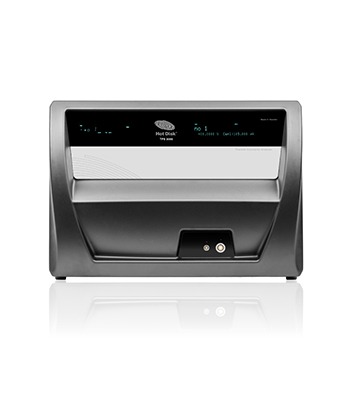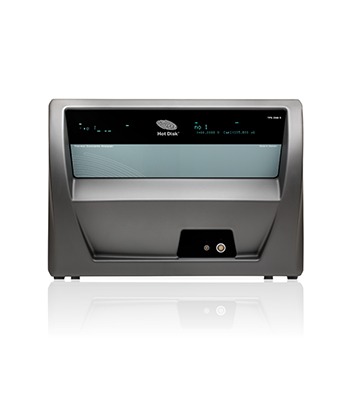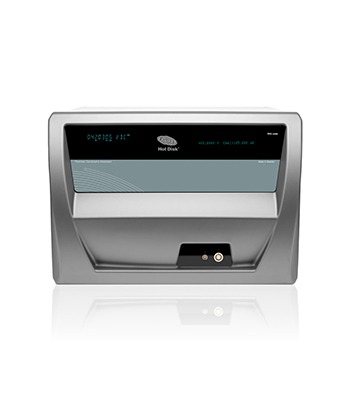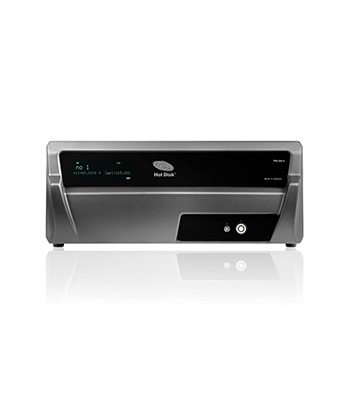Hot Disk® Instrument TPS 1500 Model:TPS 1500
The affordable Hot Disk TPS 1500 is the ideal thermal conductivity meter for testing building materials, insulation materials or any other type of large bulk samples. The TPS 1500 Thermal Conductivity range comprises 0.01 to 400 W/m/K, and the instrument handles temperatures from -100 °C to 750 °C. Sample sizes down to a thickness of a few millimeters can be accommodated. It can also analyse the anisotropic thermal transport properties of uniaxial materials. The TPS 1500 meets ISO 22007-2 and is CE marked.
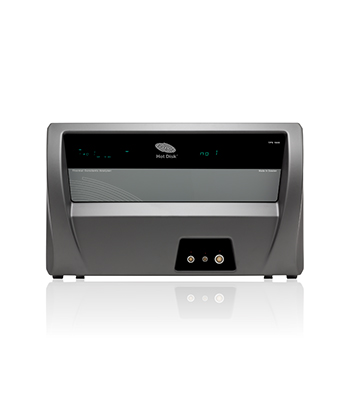
-
For heavy-duty testing
The well-established TPS technique – today used in more than 1000 laboratories – is highly appreciated for its ability to simultaneously and quickly determine thermal conductivity, thermal diffusivity and specific heat capacity from a single measurement, with minimum sample preparation. Utilizing the unique Hot Disk sensors, the TPS 1500 system serves as a robust tool for testing the thermal properties of solids, powders, pastes and foams. If larger samples are available, also highly conducting samples, such as metals, semi-conductors and high-conductivity oxides, can be tested.The TPS 1500 is designed as a reliable workhorse instrument for materials R&D within heavy-duty industries. The construction industry, for example, will see concrete and cement mixtures, woods, fibrous structures, and insulating materials readily and efficiently analysed. The Hot Disk Analysis software for the TPS 1500 system incorporates tools for automated measurements as well as automatic temperature control of external devices. In addition to the standard Isotropic and One-dimensional software modules the system can be extended with software to allow testing of anisotropic samples (Anisotropic module) and extremely light and low-conducting materials (Low-density/Highly-insulating module). Also available is a dedicated module for analysing specific heat capacity of solid samples, such as complex composites (Cp module).The Hot Disk Thermal Analyser software for the TPS 1500 system incorporates tools for automated measurements as well as automatic temperature control of external devices. It also incorporates tools for exporting results to 3rd-party software (MS Excel), for additional processing or statistical analysis. For precise and automatic temperature readings an optional PT-100 temperature sensor is available.Key Features
Sensors
The TPS 1500 operates a selection of Hot Disk sensors suitable for different materials and applications.Temperature Control
Automatic Temperature series measurements (Isothermal Steps) are easy to perform using either an optional external Furnace or a temperature-controlled Circulating Bath. The Hot DiskEverything to get you started
Analysis software and TPS 1500 instrument controls the external device using RS-232 protocol.The basic TPS 1500 setup includes everything you need to begin making measurements. The instrumentation includes: Software with standard isotropic module, one Sensor, Stainless Steel verification samples and a Room-Temperature Sample Holder.Optional Software Modules
In addition to the standard ISOTROPIC and ONE-DIMENSIONAL modules, optional ones for ANISOTROPIC, SPECIFIC HEAT CAPACITY, and LOW-DENSITY, HIGHLY-INSULATING SAMPLES are available. -
Sample Types Bulks, rods, slabs, sheets, foils, films, laminates, composites, minerals, batteries, textiles, granules, powders, pastes, gels, liquids, foams and insulators. Evaluation Anisotropy Yes, uniaxial materials can be characterised, using optional Anisotropic Measurement Module. One-Dimensional Yes, axial estimations possible for a complex sample configuration. Sample Dimensions Smallest Bulk sample: 3 mm thick x 13 mm wide (circle or square). Rod sample: 20 mm long x 7 mm wide (circle or square). Largest Bulk sample: unlimited Rod sample: unlimited length x 60 mm wide (circle or square). Sample Temperature Range -100°C to 750°C. Core Instrument RT. With Optional TCU
Tubular Furnace: RT to 750°C. Muffle Furnace: RT to 750°C. Convection Oven: RT to 600°C. Bath Circulator: -30°C to 200°C. Cryostat: -100°C to RT. Measurement Time 20 to 5120 seconds (depending on sample material and sensor dimensions). Measurement Range Thermal Conductivity Bulk sample: 0.01 to 50 W/m/K. Rod sample: 1 to 400 W/m/K. Thermal Diffusivity Bulk sample: 0.01 to 30 mm²/s. Rod sample: 1 to 100 mm²/s. Thermal Effusivity 20 to 35000 W√s/m²/K. Specific Heat Capacity Up to 5 MJ/m³/K. Measurement Accuracy Thermal Conductivity Better than 5%. Thermal Diffusivity Better than 10%. Measurement Reproducibility Thermal Conductivity Typically better than 2%. Thermal Diffusivity Typically better than 5%. Measurement Repeatability Thermal Conductivity Typically 0.059% (Stainless Steel bulk sample, Kapton-insulated Hot Disk sensor model 5501, and 22°C sample temperature). Thermal Diffusivity Typically 0.80% (Stainless Steel bulk sample, Kapton-insulated Hot Disk sensor model 5501, and 22°C sample temperature). Measurement Sensitivity Temperature Typically 44 μK (Stainless Steel sample, Kapton-insulated Hot Disk sensor model 5501, and 22°C sample temperature). -
The accuracy and precision of Hot Disk® instruments, coupled to the ease with which they test for relevant Thermal Conductivity, Thermal Diffusivity, Thermal Effusivity and Specific Heat Capacity has made them very popular with R&D and QC customers. These are often connected to industries of robotics, automotive, aerospace, manufacturing, electronics, photonics, semiconductor, energy storage, construction, biotechnology, life sciences, food, textile etc. Hot Disk® instruments also offer an unmatched measurement range and capability of tackling all manner of sample types – coatings, films, sheets, slabs, rods, bulks, solids, liquids, pastes, gels, powders, and insulators. This excellence of performance has garnered Hot Disk thousands of satisfied users. Our clients have been pleased to note and confirm that their Hot Disk instruments readily and accurately tackle a vast range of applications within topical areas of building materials, batteries, polymers, metals, thermal interface materials, thermoelectrics, aerogels, graphites, graphene, crystals, semiconductors, ceramics etc.





